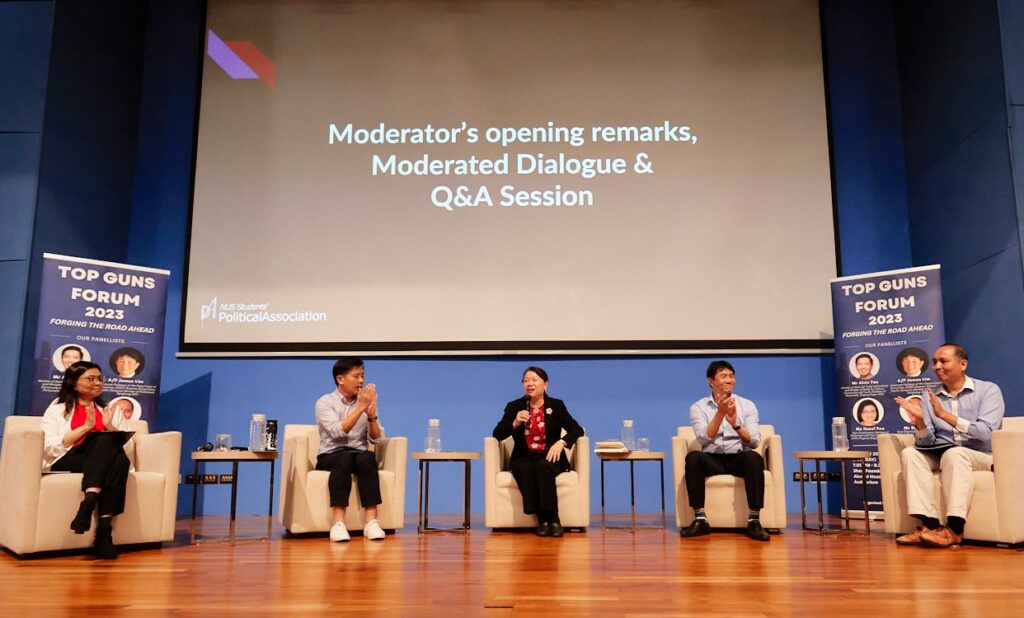I participated in NUSPA’s Top Guns Forum as one of the panelists, together with representatives from PAP, WP and SDP: Mr Alvin Tan, A/P Jamus Lim and Mr Bryan Lim. Below is the short opening speech that I shared:
======
First of all, I would like to thank the organisers for inviting me to this forum. I appreciate this opportunity to be here and exchange views.
We saw quite a lot of encouraging changes in GE2020. The opposition won 10 seats, which was a record number. The number of women MPs elected was also a record 27 seats. This brings the percentage of women MPs to just under 30%. We have made progress, but this is still an under-representation.
Going forward, I hope to see greater participation in politics from youth and women.
We all know we have an aging population. Now that means that a bigger and bigger proportion of our voters are in the older age groups. Under a one man one vote system, this means that the concerns of older people are likely to dominate.
Of course, we have parents who would be thinking about the future of their children, but we also have an increasing number of people who stay single or decide not to have children.
So it is even more important now than ever before for youths to get involved in politics and speak up to register their concerns. I don’t think it is a healthy development if the concerns of the older folks overwhelm those of the younger ones. We risk becoming more short-sighted, and it could be detrimental to our development over the longer term.
Like the Worker’s Party (WP), the Progress Singapore Party (PSP) advocates for the voting age to be lowered to 18 for three key reasons:
• In many other countries, the voting age is 18 or lower
• While our National Servicemen have a duty to defend our country at 18, these 18-year-olds should also have the right to elect their leaders
• In many instances, people assume responsibilities at 18 years old, for example entering into contracts, driving and consuming alcohol
We believe that lowering the voting age will encourage more youths to get more involved in politics. It will also better balance the age profile of our voters.
We need more discussion forums like this one where youths can participate and explore different perspectives and priorities. And I don’t think it should be limited to only the University level. I would love to see political discussions and debates happening in schools from the secondary levels onwards. We should introduce to students not just the establishment views and narratives, but also alternative ones to help them develop critical thinking from a younger age.
The future economy is driven by innovations, and that means our people need to be comfortable with questioning and challenging established norms and conventional wisdom in order to come up with better ideas.
Another area I wish to see is more women in politics.
Studies into women representation on the Board of Directors found that companies with women on their Boards perform better than companies without.
Specifically for women in politics, research indicates strong evidence that as more women are elected to office, there is increased emphasis on policies that affect quality of life and reflects the priorities of families, women, and minorities.
It was also observed that women are more likely to work across party lines and be highly responsive to constituent concerns.
Voters seem to instinctively know these, because when we look at the GE2020 results, women candidates have a significantly higher chance of winning than male candidates.
|
No of Candidates |
Elected |
Percentage |
|
| All parties |
191 |
93 |
48.7% |
| Men |
151 |
66 |
43.7% |
| Women |
40 |
27 |
67.5% |
| PAP |
93 |
83 |
89% |
| Men |
68 |
59 |
86.8% |
| Women |
25 |
24 |
96% |
| WP |
21 |
10 |
47.6% |
| Men |
16 |
7 |
43.8% |
| Women |
5 |
3 |
60% |
There were a total of 191 candidates in GE2020, of which 93 were elected, giving us an average winning percentage of 48.7%. Out of the 191 candidates, 151 were male, of which 66 were elected, giving us a winning rate of 43.7%. There were 40 women candidates and 27 won, giving a winning rate of 67.5%. The winning rate for women is more than 50% higher than their male counterparts. And if you look at the numbers broken down by political parties, we also see that the women candidates have a higher winning rate than the men.
I found these results interesting and share them in the hope of encouraging more women to run for politics.

